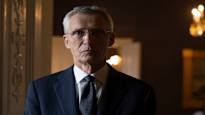On his first visit to NATO-Finland, the Secretary General of NATO emphasized the unanimity of the allies on behalf of Ukraine, writes ‘s NATO special reporter Maria Stenroos.
Jens Stoltenberg first visit In NATO-Finland, the moment comes when Finland’s hopes for NATO start to become clear.
Like other Nordic countries, Finland wants its defense to be under the US Norfolk command. Here, the command would be represented by the ground forces staff, with Mikkeli as one of the options.
A solution is expected in the coming weeks.
In addition, Finland hopes to find NATO countries that commit to train regularly in Finland and show up to support Finland if the situation starts to tighten.
Negotiations are in progress. According to ‘s information, the number of troops constantly training here would be closer to thousands than hundreds in Finland’s hopes.
However, Finland’s number one priority is a strong national defense, also in NATO. That is the reason why Finland is also valuable to NATO.
A one-inch approach to Russia’s war of aggression unites Europe and NATO. The countries are equipping themselves, NATO is training seriously, and Ukraine is promised to be supported “as long as there is a need”.
In Stoltenberg’s speeches in Helsinki, it was repeated that NATO is stronger than ever. This is difficult to measure when, at the same time, the ammunition stocks of many NATO countries and their own defense are very scarce. The ramp-up of the defense industry takes time.
However, strength is emphasized for a reason. Stoltenberg reminded several times that NATO is equipping itself so that there is no war. The message to Russia is that NATO countries should not be attacked, because the countries defend themselves together.
Finnish President Alexander Stubb and NATO Secretary General Jens Stoltenberg also discussed Russia’s future in the Atlantic Society discussion.
Stoltenberg’s response surprised.
– I don’t think we should regret that we tried to improve the relationship between NATO and Russia, Stoltenberg said.
He referred to the time after the Cold War, when at the turn of the millennium many believed that, for example, economic cooperation could be done with Russia. Stoltenberg was the prime minister of Norway at the time.
– It is not a natural law or set in stone that we always have to have a bad relationship with Russia, NATO’s Secretary General said.
After that, it was the turn of self-criticism: at what point should you have noticed that normal cooperation is not successful? Now, when Russia is waging a war of aggression, there is no discussion and, according to Stoltenberg, it cannot be said when it would be possible.
Alexander Stubb’s answer was more straightforward: he does not believe that the core of Russia’s foreign policy will change, but that it will continue to be imperialist and suspicious of the rules-based world order.
This reflects the way of thinking currently prevailing in Finland, where Russia is and will remain a dangerous neighbor, as history has taught. The previous cautious way of speaking, where one was careful not to irritate Russia, ended at once when Finland joined NATO. It was replaced by frankness.
